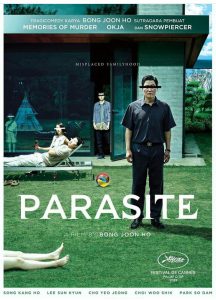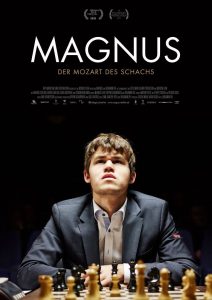South Korean director Bong Joon-ho has spent his career making expertly crafted, genre-defying films. With his latest film he has managed to outdo himself and reach lofty new heights. In Parasite, co-written with Han Jin-won, Bong draws upon many of the hallmarks of his earlier films – the modulated tension of Memories of Murder; the capitalist critique of Snowpiercer; the organic familial dynamics in The Host – but channels them into something entirely singular. It is impressive across the board and executed with confidence and style, affirming Bong’s status as an accomplished auteur.
The film focuses on two families, each with contrasting socio-economic fortunes. The Kim family – father Ki-taek (Song Kang-ho), mother Chung-sook (Jang Hye-jin), son Ki-woo (Choi Woo-shik) and daughter (Park So-dam) – struggle to find ongoing employment. They sponge off the neighbours’ Wi-Fi, and eat, crouched, around a small table. From their semi-basement dwelling they are always gazing upwards, beyond. Theirs is an outward outlook, always looking for opportunities to ascend. On the other hand, the Park family – father Dong-ik (Lee Sun-kyun), mother Yeon-kyo (Cho Yeo-jeong) and their two young children – live in stylish splendor. They have a team of household support, and host lavish backyard garden parties. From their expensive mansion atop a hill they only see the walls surrounding their expansive private property. Theirs is an insular outlook, bounded by unbounded abundance.
Poverty and privilege, scarcity and surplus, wits and wealth. Two families, two classes. But when their fortunes cross paths, the narrative unfolds with one unexpected turn after another – to comical, exhilarating, tragic effect.
 This is a film with an uncompromising, exacting vision executed with uncompromising, exacting flair. The performances are all perfectly pitched and complementary. They portray nuanced and diverse familial relationships filtered through class-based hopes, anxieties and insecurities. The screenplay is intelligent, layered and self-reflexive, handling tonal transitions with seamless ease. It captures both the palpable condescension of the haves and the resourceful desperation of the have-nots. And Lee Ha-joon’s production design and Hong Kyong-pyo’s cinematography are impeccably synchronized. Together, they create distinctly immersive spaces and atmospheres for each family setting, from the clean, clinical lines of the Park family residence, to the cramped visual framings of the Kim family’s conversations. Their reciprocal sensibilities only enhance the film’s themes.
This is a film with an uncompromising, exacting vision executed with uncompromising, exacting flair. The performances are all perfectly pitched and complementary. They portray nuanced and diverse familial relationships filtered through class-based hopes, anxieties and insecurities. The screenplay is intelligent, layered and self-reflexive, handling tonal transitions with seamless ease. It captures both the palpable condescension of the haves and the resourceful desperation of the have-nots. And Lee Ha-joon’s production design and Hong Kyong-pyo’s cinematography are impeccably synchronized. Together, they create distinctly immersive spaces and atmospheres for each family setting, from the clean, clinical lines of the Park family residence, to the cramped visual framings of the Kim family’s conversations. Their reciprocal sensibilities only enhance the film’s themes.
But the film’s commentary is broader, and more far-reaching, than the families at the centre of the story. For as much as the film is about two disparate worlds clashing, it is also about one world. The Kim family may see in the Park family a chance to better their lives, but the Park family’s comfort and prosperity is also founded on, in ways explicit and implicit, on the Kim family (and others like them). They are inextricably linked to, and dependent on, each other, albeit in grossly unequal and unfair ways.
And this world that they jointly inhabit is also our world. It is this world. In telling the enthralling story of two families and their intertwined fates, director Bong Joon-ho critiques capitalism’s exploitative logics. He discerns how these pervasive logics often compel us to see people as obstacles, opportunities, objects, others – as always already less than, or always already more than.
This is masterful storytelling told by a modern master – a story about the times, for the times.
Parasite was released in Australia on 27th June 2019 through Madman Films and is still screening at Cinema Nova.






1 Comment